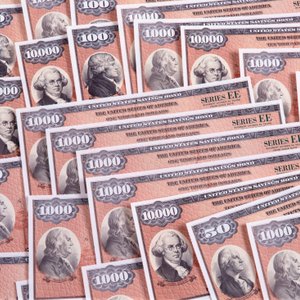
U.S. Savings Bonds are a way to invest in America. The U.S. Treasury Department issues bonds, backed by the federal government. By buying them, you help finance government operations. During World War II, for instance, the government used bonds to finance the war. There are many advantages to investing in bonds, but they do have some drawbacks.
History
The United States offered Treasury securities as far back as 1776, the U.S. Treasury reports, but the value fluctuated and some people lost money investing in them. In 1935, President Franklin D. Roosevelt's administration introduced savings bonds as a safe investment: If you buy a $500 savings bond, for instance, it will never be worth less than $500.
Types
There have been many types of bond over the years, but the treasury department currently issues only two forms, according to the Bankrate website. Series I bonds accrue interest at a fixed rate, with an added amount of variable interest on top of that. Series EE bonds issued, since 2005, have a fixed rate of interest, though earlier bonds are more variable. The treasury no longer issues HH bonds, which pay interest into your bank account at regular intervals, but some Americans still own them.
Features
You can buy bonds in either paper or electronic form, according to Penn State University. The treasury offers electronic bonds online or through a payroll savings plan. You buy them at face value, and they accrue interest based on that value. You can buy paper bonds through a savings plan from your bank or credit union. Paper bonds sell at half their face value, then mature.
Benefits
Buying bonds is an extremely safe investment, Bankrate advises, since the U.S. Government secures them. Interest rates for I and EE bonds are competitive and you won't pay state or local income taxes on the interest. The government defers federal tax until the bonds mature. If you use the proceeds to pay for college, you might avoid federal tax completely.
Drawbacks
Bonds do have some drawbacks, Penn State points out. You can't cash them for the first year after you buy them, and if you redeem them in the first five years, you'll pay a penalty equal to three months interest. Another weakness is there are other forms of investment that offer greater rates of return, though those alternatives may be riskier.
References
- Bankrate: Five Common Questions About Savings Bonds
- U.S. Treasury: Beginning of the Savings Bond Program
- Penn State: Saving For Your Future
- Financial Industry Regulatory Authority. "Bonds and Interest Rates." Accessed Aug. 10, 2020.
- TreasuryDirect. "Interest Rates and Terms for Series EE Savings Bonds." Accessed Aug. 10, 2020.
- U.S. Securities and Exchange Commission. "Bonds." Accessed Aug. 10, 2020.
- Treasury Direct. "Series EE/E Savings Bonds Tax Considerations." Accessed Aug. 10, 2020.
- TreasuryDirect. "Tax Considerations for I Bonds." Accessed Aug. 10, 2020.
- TreasuryDirect. "Education Planning." Accessed Aug. 10, 2020.
- IRS. "Topic No. 403 Interest Received." Accessed Aug. 10, 2020.
- TreasuryDirect. "Series I Savings Bonds FAQs - How Is the Earnings Rate of an I Bond Determined?" Accessed Aug. 10, 2020.
- U.S. Securities and Exchange Commission. "Saving Bonds." Accessed Aug. 10, 2020.
- TreasuryDirect. "Using Your Income Tax Refund to Buy Paper Savings Bonds." Accessed Aug. 10, 2020.
- TreasuryDirect. "Cashing (Redeeming) Series I Savings Bonds." Accessed Aug. 10, 2020.
- TreasuryDirect. "Open an Account - Intro." Accessed Aug. 10, 2020.
- TreasuryDirect. "Convert Your Paper Savings Bonds Using SmartExchange." Accessed Aug. 10, 2020.
- TreasuryDirect. "Savings Bonds as Gifts." Accessed Aug. 10, 2020.
- TreasuryDirect. "Savings Bonds as Gifts." Accessed Aug. 10, 2020.
- TreasuryDirect. "Cashing (Redeeming) EE and E Savings Bonds." Accessed Aug. 10, 2020.
- TreasuryDirect. "When Interest Is Added to Your Bonds." Accessed Aug. 10, 2020.
Writer Bio
A graduate of Oberlin College, Fraser Sherman began writing in 1981. Since then he's researched and written newspaper and magazine stories on city government, court cases, business, real estate and finance, the uses of new technologies and film history. Sherman has worked for more than a decade as a newspaper reporter, and his magazine articles have been published in "Newsweek," "Air & Space," "Backpacker" and "Boys' Life." Sherman is also the author of three film reference books, with a fourth currently under way.

